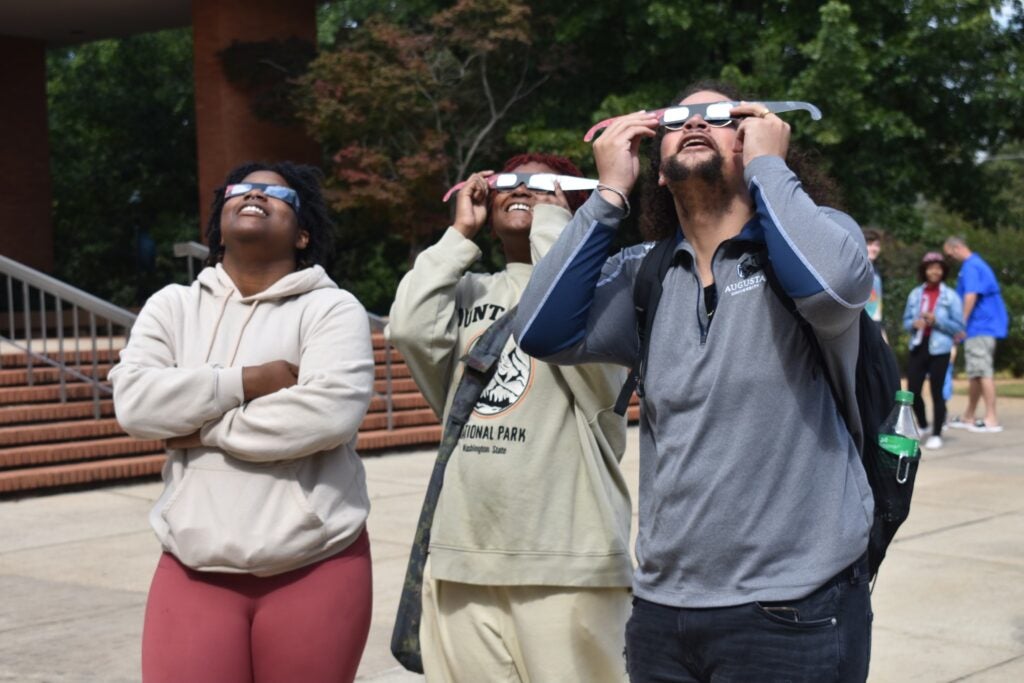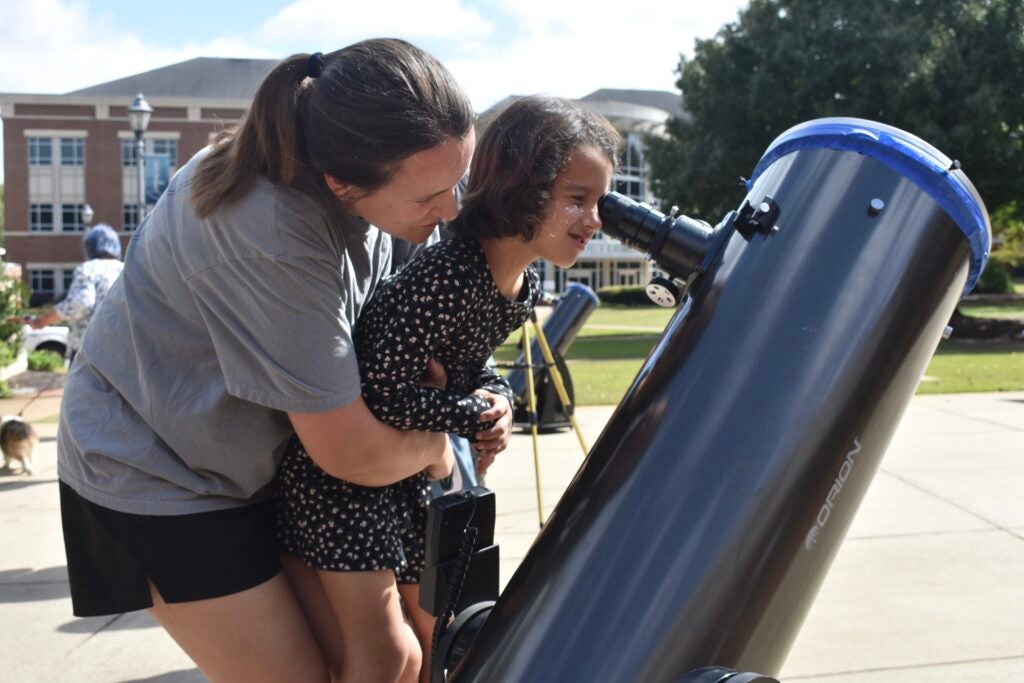Students, staff and local Summerville neighbors gathered at Augusta University to gaze at the ‘Ring of Fire’ partial eclipse on Saturday, Oct. 14.
From 11:48 a.m. to 2:48 p.m., the university’s Physics Club hosted a viewing party at the Summerville Campus’ Grove, located in front of the Maxwell Theater, allowing attendees to take advantage of three telescopes.
According to student committee members of the club, Lexi Dowdy and Evan Pate, an eclipse occurs on the rare instance when the moon passes in between the sun and the Earth.
This year’s eclipse is known by the moniker ‘Ring of Fire’ as a result of the moon being further away from Earth than usual, causing it to appear smaller and only cover a portion of the sun – showcasing what looks to be a fiery ring of solar flares and pronounced sunspots.
Hoping to recruit more students to the Physics Club, Dean Meyer, involved in the club’s student leadership, said he hopes the event propels further community outreach that inspires more folks to become interested in science.
“Science is really cool – that’s what we want people to always think … it’s really important for the university to do public outreach, and this is a great chance for us as a physics club to be able to do that,” he said. “We have [today’s] eclipse and one in April, and then we won’t have another one in the Southeast until the mid 2040s. So, this is kind of your second to last chance to see one in the next couple of decades.”

To Dowdy, who helped maintain telescope alignment throughout the event, sharing the university’s telescopes encouraged more significant and memorable community interaction.
“It’s good to bring everyone together in one place to come watch the solar eclipse, especially since it’s a really big phenomenon and it doesn’t happen all the time,” said Dowdy. “Students can also learn something from viewing it from the telescopes, which they might not have access to at home.”
Helping attendees navigate the telescopes, Pate said he enjoys educating fellow students and locals about the science behind the eclipse predictions and the real life example of why physics is important.
“It allows a further understanding of how the solar system is actually moving,” he said. “The actual physics to find out when the eclipse was going to happen is very precise math. So, it’s important in multiple ways … and you can see it – everyone wants something they can see.”
As free eclipse glasses were made available to the first 500 people, members from the club educated attendees while friends and children oohed and aahed at the slowly emerging sun veiling.

“Science is all about observation first and then you want to apply theory to it, so this is something people can actually observe in the sky,” said Dowdy.
With the moon covering about half the sun at peak eclipse, occurring at approximately 1:17 p.m., many attended the university’s event to enjoy the spectacle.
“I think this is amazing. I also think, as a science and chemistry major, that bringing more awareness with events like this can open our eyes up to how insane and cool these things can be, especially when you’re studying them,” said Dee Mallory, president of Augusta University’s Student Government Association. “I think people should maybe invest more time in being connected with nature and our solar system.”

Mallory also said he believes such community openness is also important because it gives many individuals the chance to use more advanced technology, such as telescopes, in a group setting.
While various students attended the gathering and marveled at the sky, some families also attended to teach their children about Earth’s naturally occurring enigmas.
“It’s exposure for them. This is something we don’t get to see everyday,” said Laurie Vera, attending university professor who brought her two young children. “It lets them understand more about our world and how it works. It’s important to explore the world and different interests from a young age, so that they can be aware of it.”

According to data provided by Time and Date, an online database that provides varying astronomy information, the next eclipse will take a diagonal path from Texas to Maine on April 8, 2024.
Following the April eclipse, Georgia’s next solar eclipse will take place on Aug. 12, 2045 but, for Georgians, it will appear as another partial eclipse. However, a total lunar eclipse will occur on March 13 and 14, 2025.











